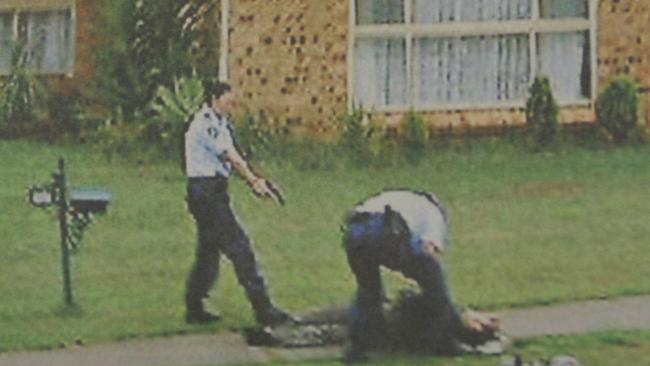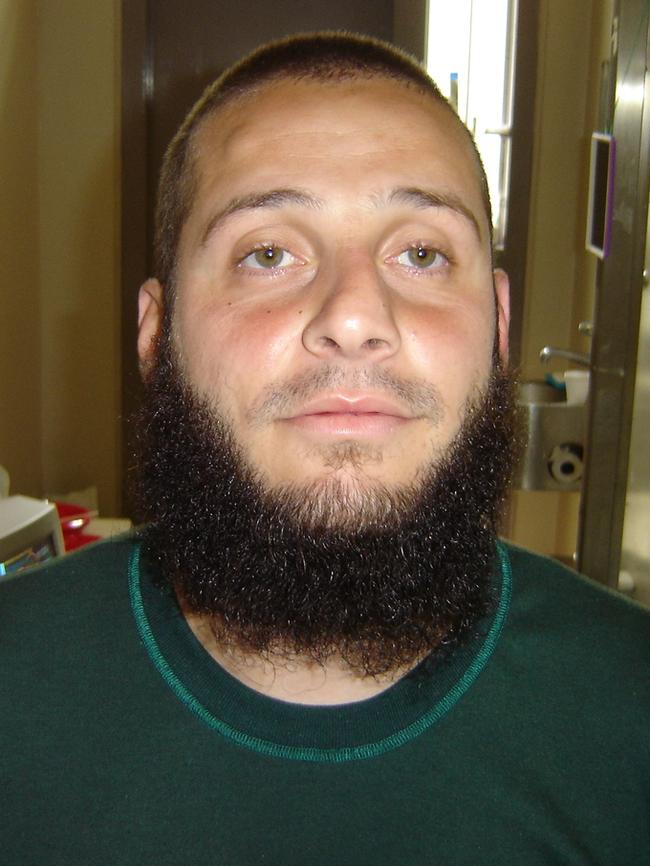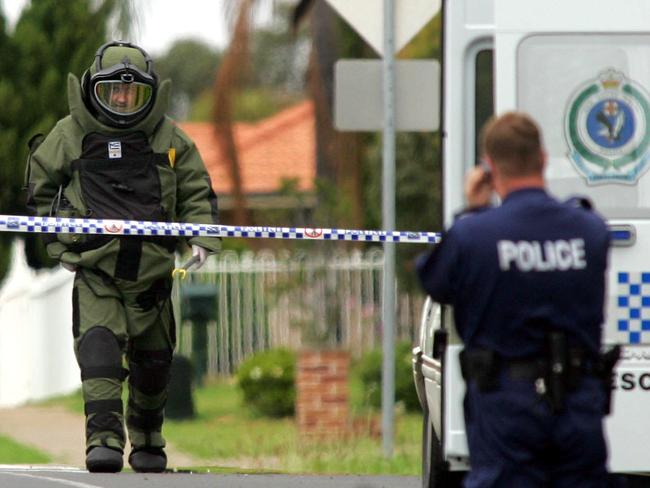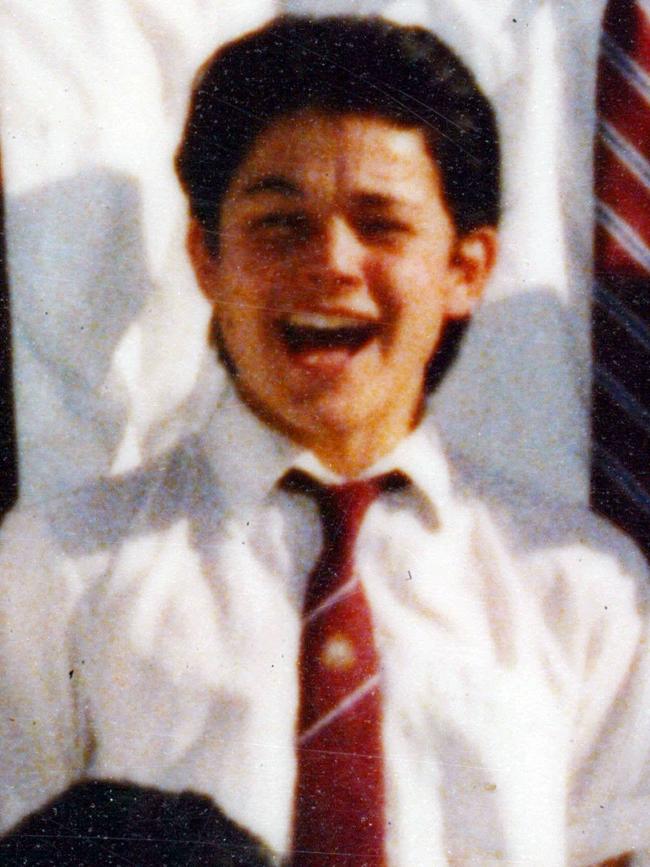Aussie jihadi Omar Baladjam claims Supermax ‘too harsh’
A former bit actor on Home and Away, who was involved in Australia’s biggest terrorism plot and shot a police officer, has complained his jail time is too hard, with grievances including his coloured pencils being taken away.
Behind the Scenes
Don't miss out on the headlines from Behind the Scenes. Followed categories will be added to My News.
A convicted jihadi — and a former bit actor on Home and Away — involved in Australia’s biggest terrorism plot has complained he is doing much harder jail time than one of his co-offenders and the nation’s first convicted terrorist Faheem Lodhi.
And one of the reasons he is giving is the banning of coloured pencils.
Countdown to terror: The night we dodged an Australian 9/11
Radicalisation: 100 terror threats who want to destroy this country

Life behind bars in the Goulburn Supermax, according to Bradley Umar Sariff Baladjam, is tougher than ever before as a result of the country’s elevated terrorism threat level in 2015.
Baladjam’s lawyers made an appeal to the NSW Court of Criminal Appeal to reduce his sentence, claiming through no fault of his own, a prison crackdown meant he lived under conditions that could not have been taken into account by the sentencing judge when he was sentenced 14 years ago.
Recruits: Crims convert to ‘Prislam’ as terror groups target Supermax
First look: Inside new Supermax 2 terror jail built to hold radicals
During his sentence Baladjam had gone from being classified as an AA prisoner to the highest level — extremely high risk restricted (EHRR) prisoner — and those restrictions were much harsher than those endured by his co-offender Mazen Touma and by Lodhi, who was convicted of plotting to blow up Sydney’s electricity grid.
Touma has been released from jail on parole. Lodhi, remains in prison but in a lower classification jail. His bid for parole earlier this year was refused.

Baladjam told the court in an affidavit, the reclassification to EHRR imposed “much greater harsh and onerous conditions on an inmate” and “there was much less opportunity to get away from my cell”.
He complained that when Touma and Lodhi were held in the Supermax they were allowed to associate with others more freely outside of their cells, make more phone calls, and share books, food and magazines.
They were also allowed to have painting materials and colouring pencils.


Now Baladjam claims he has no access to those activities nor is he able to continue the TAFE courses he had enrolled in.
He did however, manage to complete a certificate IV in permaculture before the TAFE courses were cut.
When Baladjam was arrested in 2005 during a string of terror raids under Operation Pendennis in Sydney, he shot a police officer in the hand, and he was then shot in the neck.
Baladjam pleaded guilty in 2008 and was given a 14 year-minimum sentence for four charges in which he was involved in preparations for terrorist act.

At the time the sentencing judge gave him a 15 per cent discount on his sentence for co-operating with authorities and took into account the conditions he would be held in. Touma was given a 25 per cent discount for co-operating.
In a separate trial in 2012, Baladjam was convicted and given an extra 18 months for discharging a firearm in public and possession of an unlicensed firearm.
Baladjam’s list of complaints includes that he has had no access to therapy for his injuries sustained when he was shot.
Evidence submitted on Baladjam’s behalf said his security classification has been downgraded and despite recommendations he be moved to Lithgow jail, he remains in the Supermax.
A 2017 report about Baladjam also said he was no longer vulnerable to influences of faith or ideology.

But the NSW Court of Criminal Appeal has dismissed his appeal and rejected evidence about the harsher conditions imposed as a result of changes by the prison executive.
He will remain behind bars for at least another two years.
The Chief Justice Tom Bathurst with Justice Clifton Hoeben and Justice Desmond Fagan in agreeance dismissed the appeal for a lighter sentence.
“While the sentence was undoubtedly severe, the crimes themselves were very serious carrying the life imprisonment in respect of two counts,” the decision said.
“The ammunition and chemicals were obtained for the purpose of a terrorist act which, while not intended to kill people, was calculated to damage property endanger life and cause disruption and fear in the community in pursuit of extremist beliefs.
“Such acts warrant severe punishment. Taking all the matters raised by the applicant into account, it does not seem to me that the sentence imposed was manifestly excessive.”

LIFE INSIDE FOR A JIHADI ACCORDING TO BALADJAM
Locked cell with no opening window
Not enough light to read
Little ventilation
Temperature not regulated
Frequent cell searches with “all items taken out for x-ray and searching”
Strip searched on every visit
Inmates cuffed and shackled during visits
Issued with:
1 plastic cup
1 plastic bowl,
1 plastic plate
1 set of disposable cutlery
1 disposable shower curtain
1 toothbrush (length of a thumb)
Not allowed any more:
No library
No sharing of books, magazines or food
No art supplies
Little access to education
No medical therapy for his arm injury as a result of gunshot injury
No Arabic allowed to be spoken in phone calls, visits or letters
Originally published as Aussie jihadi Omar Baladjam claims Supermax ‘too harsh’
